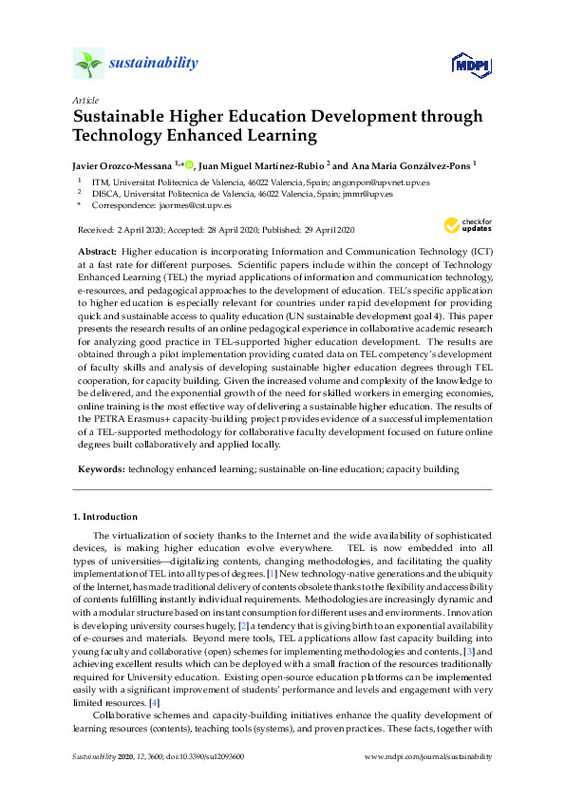Abdullah, F., & Ward, R. (2016). Developing a General Extended Technology Acceptance Model for E-Learning (GETAMEL) by analysing commonly used external factors. Computers in Human Behavior, 56, 238-256. doi:10.1016/j.chb.2015.11.036
Becker, H. J., & Ravitz, J. (1999). The Influence of Computer and Internet Use on Teachers’ Pedagogical Practices and Perceptions. Journal of Research on Computing in Education, 31(4), 356-384. doi:10.1080/08886504.1999.10782260
Mumford, S., & Dikilitaş, K. (2020). Pre-service language teachers reflection development through online interaction in a hybrid learning course. Computers & Education, 144, 103706. doi:10.1016/j.compedu.2019.103706
[+]
Abdullah, F., & Ward, R. (2016). Developing a General Extended Technology Acceptance Model for E-Learning (GETAMEL) by analysing commonly used external factors. Computers in Human Behavior, 56, 238-256. doi:10.1016/j.chb.2015.11.036
Becker, H. J., & Ravitz, J. (1999). The Influence of Computer and Internet Use on Teachers’ Pedagogical Practices and Perceptions. Journal of Research on Computing in Education, 31(4), 356-384. doi:10.1080/08886504.1999.10782260
Mumford, S., & Dikilitaş, K. (2020). Pre-service language teachers reflection development through online interaction in a hybrid learning course. Computers & Education, 144, 103706. doi:10.1016/j.compedu.2019.103706
Lee, D., Watson, S. L., & Watson, W. R. (2020). The Relationships Between Self-Efficacy, Task Value, and Self-Regulated Learning Strategies in Massive Open Online Courses. The International Review of Research in Open and Distributed Learning, 21(1), 23-39. doi:10.19173/irrodl.v20i5.4389
Passey, D. (2019). Technology‐enhanced learning: Rethinking the term, the concept and its theoretical background. British Journal of Educational Technology, 50(3), 972-986. doi:10.1111/bjet.12783
Lai, Y.-C., & Peng, L.-H. (2019). Effective Teaching and Activities of Excellent Teachers for the Sustainable Development of Higher Design Education. Sustainability, 12(1), 28. doi:10.3390/su12010028
Lee, S., Lee, H., & Kim, T. (2018). A Study on the Instructor Role in Dealing with Mixed Contents: How It Affects Learner Satisfaction and Retention in e-Learning. Sustainability, 10(3), 850. doi:10.3390/su10030850
“Continuous Improvement in Teaching Strategies through Lean Principles”. Teaching & Learning Symposium, University of Southern Indiana http://hdl.handle.net/20.500.12419/455
The DeLone and McLean Model of Information Systems Success: A Ten-Year Update. (2003). Journal of Management Information Systems, 19(4), 9-30. doi:10.1080/07421222.2003.11045748
Goodman, J., Melkers, J., & Pallais, A. (2019). Can Online Delivery Increase Access to Education? Journal of Labor Economics, 37(1), 1-34. doi:10.1086/698895
Alexander, J., Barcellona, M., McLachlan, S., & Sackley, C. (2019). Technology-enhanced learning in physiotherapy education: Student satisfaction and knowledge acquisition of entry-level students in the United Kingdom. Research in Learning Technology, 27(0). doi:10.25304/rlt.v27.2073
How Can Adaptive Platforms Improve Student Learning Outcomes? A Case Study of Open Educational Resources and Adaptive Learning Platforms https://ssrn.com/abstract=3478134
Sun, A., & Chen, X. (2016). Online Education and Its Effective Practice: A Research Review. Journal of Information Technology Education: Research, 15, 157-190. doi:10.28945/3502
EU Commission https://ec.europa.eu/education/education-in-the-eu/digital-education-action-plan_en
Essence Project https://husite.nl/essence/
Orozco-Messana, J., de la Poza-Plaza, E., & Calabuig-Moreno, R. (2020). Experiences in Transdisciplinary Education for the Sustainable Development of the Built Environment, the ISAlab Workshop. Sustainability, 12(3), 1143. doi:10.3390/su12031143
Kurilovas, E., & Kubilinskiene, S. (2020). Lithuanian case study on evaluating suitability, acceptance and use of IT tools by students – An example of applying Technology Enhanced Learning Research methods in Higher Education. Computers in Human Behavior, 107, 106274. doi:10.1016/j.chb.2020.106274
[-]









